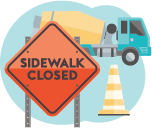There’s a reason for the reviews, permits and approvals. It’s to ensure public health and safety, preservation of Saint Paul’s unique historic assets, and, of course, your overall success! That’s something we can all agree is worth the effort.
The sooner you can complete the applications, and the better organized you are, the smoother the approval process will go. And the fewer surprises you’ll have to face. So, stay in touch, ask questions, and take comfort in knowing that with each approval you’re closer to making your dream a reality.
Things to Know
The number of reviews and approvals required by the city may vary depending on the type of business you wish to open.
- Plan early for approval if you will have a building with an exterior sign. It requires separate review, and there may be additional requirements related to heritage preservation or a master sign plan. You will need to enlist a licensed sign contractor.
- Submitting documents that are complete and meet requirements for each approval process facilitates timely review of your applications.
- Americans with Disabilities Act (ADA) and state regulations require businesses be accessible to people with disabilities.
- Enlist appropriate experts to help with your project, such as licensed and bonded contractors, architects, civil engineers, preservation architects, and environmental consultants.
- Some license types, heritage preservation reviews, or zoning changes require public hearings. Plan extra time in your process for these hearings.
- If you are opening a restaurant with a sidewalk café, you will need a separate license and permit for outdoor seating.
- Sewer Availability Charge (SAC) fees can add significant upfront costs to a project. Contact the Metropolitan Council early for an estimate of these fees based on your location and use.
- If you are told you cannot do what you are proposing, ask if there are any options available to you. You may be able to seek an appeal, alternative compliance, or determine a better idea for your business.
- Examples of things that make a project more complex:
- significant interior or exterior construction;
- changing the use of, or expanding, the facility;
- rehabilitation of a property in a heritage preservation site or district.
How the City can Help
- City of Saint Paul staff can answer any and all questions related to city zoning, licenses, permits, site plans, building plans, and inspections. We can also connect you with a Project Facilitator who serves as a single point of contact to help with permitting and licensing processes. Connect with the Department of Safety and Inspections or call 651-266-8989.
- Heritage Preservation staff can help you understand and navigate rules and processes that apply if your business will be in a heritage preservation site or district.
TAKE ACTION
Some of the following approval steps may happen simultaneously. Review this journey map to see how the various approvals, permits and licenses are interrelated. Talk to the city about what you may need for your particular situation. Not every permit or license is required for all businesses. For example, if you’re taking over a business and not intending to make any changes to the physical space, you won’t need a construction permit. Scroll down to the steps below or select one here:
Table of Contents
Zoning Approvals
Site Plan Review
Building Plan Review
Heritage Preservation Commission Review
Business Licenses
Construction Permits
State and other Entity Licenses and Approvals
Right-of-Way Permits
Building Certificate of Occupancy
Fire Certificate of Occupancy
Zoning Approvals
Zoning approval is required for:
- building permits
- licenses
- change in building use
- change in occupancy type
- signage
Zoning Review and approval ensures the desired use is permitted on the property. If needed, you may request variances, rezonings, conditional use permits, non-conforming use permits, and appeals. Applications may require scaled drawings (with elevations) and a site plan.
Timing: Zoning review for a project can range from same day to 3 weeks. Variance and other use change requests can add another 3-6 weeks. Appeals of decisions can add additional time. Rezonings and replatting take 3-4 months.
Fees: Yes
Site Plan Review
Site plan review and approval is required before permits will be issued for:
- any new construction projects
- additions
- parking lots
- major grading
Site Plan Review involves coordinated review by city staff to analyze for zoning, traffic, public utilities, storm water management, landscaping, and fire safety.
Submitted site plans must be prepared by the appropriate licensed professional, include a certified survey, and show key site elements such as buildings (with elevations), parking, sidewalks, driveways, landscaping, fences, lighting, grading, storm water drainage, and utilities.
Timing: Most site plans are reviewed by staff and do not require a public hearing. Allow approximately 2-3 weeks between submittal and review discussion. Requested revisions will add additional time.
Fees: Yes
Building Plan Review
Building plan review and approval is required before permits will be issued for:
- new construction projects
- additions to current structures
- remodeling or repairing a structure
Building Plan Review entails review of building plans for life safety designs. Submitted building plans must be prepared by an appropriate licensed professional, and include existing use of the space, building type, complete code analysis of the new use, and scaled drawings.
Timing: 4-6 weeks for a project not in a heritage preservation district or site. (Historic area approvals take longer due to the need for Heritage Preservation Commission approval.)
Fees: Yes
Heritage Preservation Commission Review
Heritage Preservation Commission (HPC) Review and Approval is required before permits can be issued for properties in Heritage Preservation Districts or Sites for the following situations:
- construction
- demolition
- repairs
- exterior alterations
Review and Approval of heritage preservation applications may be conducted by the HPC staff or the Heritage Preservation Commission to ensure that the proposed work complies the City’s established design review guidelines. Application requirements vary, and may require photographs and construction level drawings.
Timing: 2-8 weeks, depending on project size. Contact Heritage Preservation staff before submitting to ensure your application is complete and complies with the guidelines.
Fees: Yes
Business Licenses
Business licenses are required to operate many types of businesses, including:
- building trades
- commercial vehicles
- auto body and repair
- liquor
- gambling
- entertainment
Business licenses are required to ensure safety, health, and community livability. Application requirements may include business plans, scaled drawings, financials, and ownership information.
Timing: Varies depending on license. Some licenses require public notice and hearings, which can result in more than 60 days for a license to be issued.
Fees: Yes
Construction Permits
Construction permits are required for:
- new structures
- additions
- remodeling or repairs
- any changes to electrical, plumbing, or HVAC systems
Individual permits for building, electrical, plumbing, warm air and mechanical work, and other permitted work are reviewed for life safety issues. Application requirements vary, and may require construction drawings.
Timing: Scope of work dictates time to review plans. Small projects may take one or two days while larger projects may take 4-6 weeks. Approval timeframe is dependent upon inspection requests by permit holder and scope of work.
Fees: Yes
State and other Entity Licenses and Approvals
Depending on the type of business you are opening, you may need additional licenses from the State of Minnesota and other government agencies.
Right-of-Way Permits
Right-of-Way Permits are required when:
- there is an obstruction (e.g., sidewalk café)
- work is being done in the public right-of-way
Right-of-Way permits ensure the safety of the public and that the right-of-way facility (streets, sidewalks, utilities, etc.) is properly restored. Applications requirements vary, but generally involve scaled drawings.
Timing: For Obstruction and/or Excavation Permits, a minimum of one week is required to review traffic control plans, utility conflicts, and other considerations as necessary. For sidewalk cafés, a minimum of one week is required to review the scale plans. However, if corrections or changes are required additional time will be necessary.
Fees: Yes
Building Certificate of Occupancy
A new Building Certificate of Occupancy is required:
- before occupancy of any new building
- before an existing building can be occupied for a new use
Building Certificate of Occupancy involves the review of all life safety systems to ensure buildings are safe to be occupied for their designated use. The Building Certificate of Occupancy is issued after all required construction permits are approved.
Timing: Dependent upon amount of construction the project entails.
Fees: No
Fire Certificate of Occupancy
A Fire Certificate of Occupancy (C of O) is required for:
- continued use of the space, regardless of owner, after a Building Certificate of Occupancy has been issued
Fire C of Os ensure that buildings are maintained as approved under the initial Building Certificate of Occupancy for their designated use. Fire Certificates of Occupancy are renewed upon successful completion of renewal inspection.
Timing: Frequency of renewal inspections are based on type of use and are typically every 2 to 3 years.
Fees: Yes











